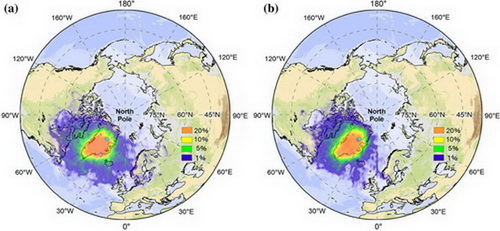Aerosols in Polar Ice Sheet Assist to Reconstruct Climatic and Environmental Condition in Greenland
Updatetime:2019-03-29From:
【Enlarge】【Reduce】
Atmospheric mineral dust (aerosols) is conserved in polar ice sheets at the time of snowfall, which is transported by atmospheric circulations and deposited on polar sheets. This material can be used to reconstruct historical climate and environmental conditions. Therefore, these substances are important indicators for variations on climatic and environmental signals.
Recently, a research group from Northwest Institute of Eco-Environment and Resources of CAS, together with their colleagues from Beijing Normal University and Chinese Academy of Meteorological Science, examined the seasonal variations of major ion species in the snow samples from the East Greenland, and analyzed concentrations of dust and ions in snow samples from the East Greenland from winter 2012 to summer 2017.
The study shows the concentrations of mineral dust and Ca2+ showed seasonal deposition events with maximum peaks during spring, which indicated that mineral dust originating from low altitudes was the main potential dust source.
Besides, the research also indicates the ash and pyroclastic materials in volcanic eruption events are transported by atmospheric circulations and deposited on polar ice sheets. Among the gases dericed from volcanic eruption events, SO2 is of particular interest due to its conversion to small sulfuric acid aerosols, which can potentially impact the radiative budget of the atmosphere at the global scale.
These results will contribute to an improved understanding of the snow chemistry of future deep ice cores in East Greenland and provide additional clues to the mechanisms underlying the dramatic variations in the volcanic history of the Greenland ice sheet in the future.
The study entitled “Climatic and environmental signals recorded in the EGRIP snowpit, Greenland” was published in Environmental Earth Sciences.

Backward trajectories of air masses arriving at the EGRIP site from 2012 to 2017 a represents the winter-spring seasons and b represents the summer-autumn seasons (Image by Zhiheng DU)
Contact:
Zhiheng DU
E-mail: duzhiheng10@163.com
State Key Laboratory of Cryospheric Science, Northwest Institute of Eco-Environment and Resources, Chinese Academy of Sciences, Lanzhou 730000, China.
Appendix




